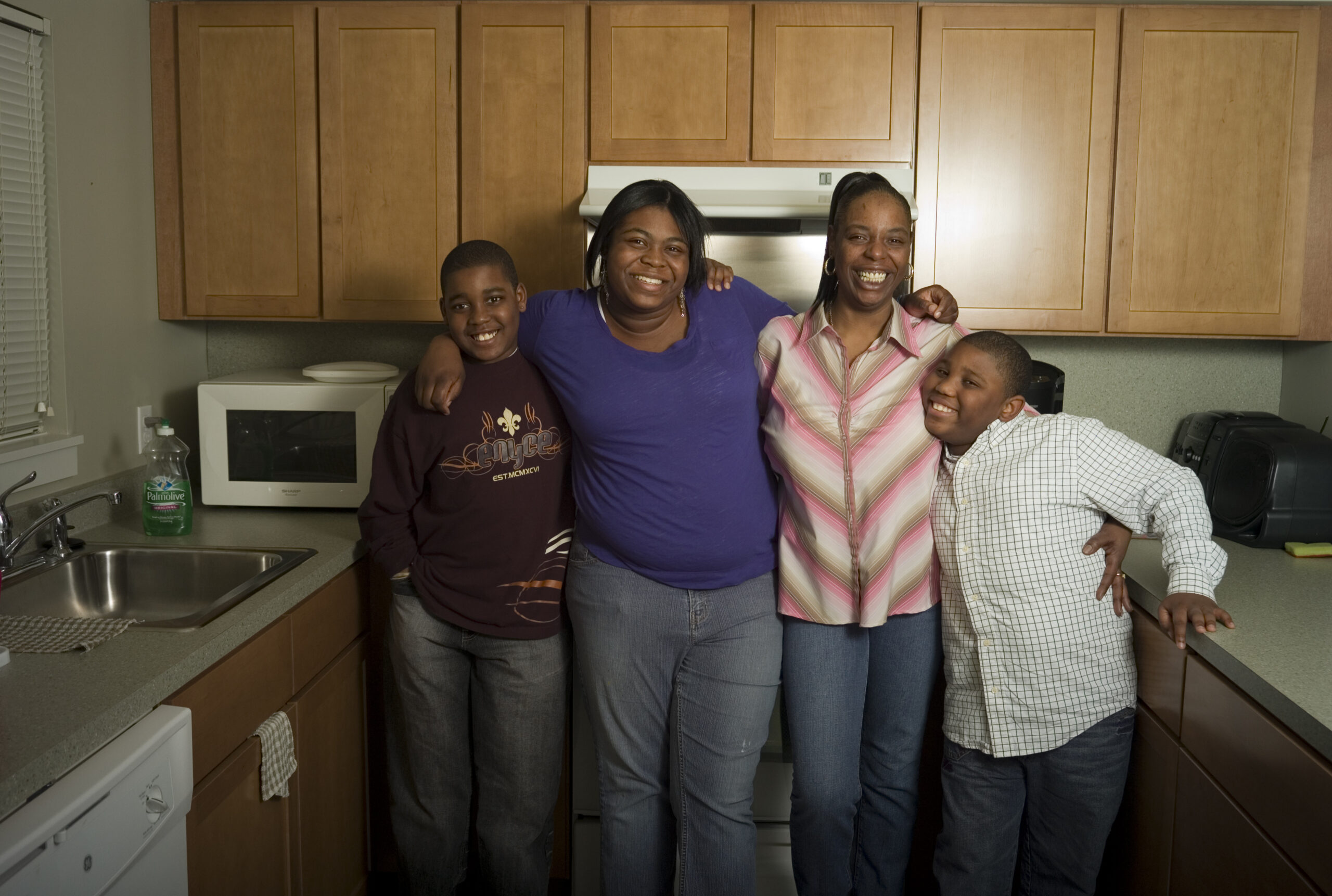Create a path to stable housing for families at risk of homelessness
Lesson Learned:
Well-designed programs that prevent evictions keep families in their homes, avoid long-term harm to children, and are far less costly for landlords than legal and turnover costs involved in evictions.
Eviction cases increased by 78.6% from 2021 to 2022 in the 34 cities in the United States tracked by the Eviction Lab at Princeton University.[1] Families who have been evicted struggle to find safe, affordable housing with an eviction filing on their record and often must move to a less safe neighborhood.[2]
Evictions also have long-term negative impacts on the mental health[3] and employment stability[4] of those affected and are especially traumatizing for children, who are more likely to drop out of high school than stably housed peers.[5]
HomeStart’s the Renew Collaborative works with tenants and their landlords in the Greater Boston Area to stop evictions and keep tenants in their homes.
“I felt as if help was around the corner, whenever I reached out to the right people. I liked the fact that I just wasn’t treated like a number. I got the undivided attention whenever I spoke to anybody on staff, as if they cared. They let me speak. They were good listeners. And even after I got the help that was needed, it feels good to know that somebody didn’t forget about me.”
-Chelsea, a tenant who received case management support from HomeStart
“When I worked with an agent from HomeStart Renew Collaborative, just in 2 days, she had resolved everything that my tenant and myself had encountered for almost one year. She not only helped my tenant for her rent arrears applications and payments, but also helped her for section 8 future payment and potential job searching for her.”
-Landlord that worked with HomeStart

What it does
The Renew Collaborative is a project of HomeStart, a housing services provider for those experiencing homelessness or at risk of homelessness in Greater Boston. The Renew Collaborative provides eviction prevention counseling for nearly 1,000 households a year.
The Renew Collaborative connects tenants facing non payment eviction with an advocate to help make an individualized plan to address the causes of their eviction crisis. The advocate helps complete paperwork and accompanies the tenant to housing court to assist with mediation between the landlord and tenant. Once an agreement is reached, the Renew Collaborative makes the first payment to the landlord and works with the tenant to identify how to pay the rest of the back rent themselves.
In addition to working with tenants who ask for the Renew Collaborative’s assistance directly, the program works with public housing authorities and private landlords to work with tenants who owe back rent instead of evicting them. Working with the Boston Housing Authority and the City of Boston, HomeStart found that evicting a household costs landlords $6,500 to $11,500 including back rent, legal fees, and turnover costs. In contrast, working with the Renew Collaborative costs landlords on average only $2,000 while keeping their tenant in their home.
How effective it Is
An external evaluation of the Renew Collaborative’s work with the Boston Housing Authority found that households served by the Renew Collaborative were 44% less likely to be evicted than peer households who also faced eviction due to nonpayment of rent in the same period. Households served by the program also paid their back rent 23% faster than the control group. Additionally, 87% of program participants maintained housing in their Boston Housing Authority unit and 95% have avoided eviction due to non-payment.[6]
The Renew Collaborative estimates that it’s saved property owners over $16 million in avoided eviction costs and Boston Housing Authority reported that the Renew Collaborative saved them over $1 million in 2017 alone.
How philanthropy helps
The Renew Collaborative receives 64% of its funding from philanthropic sources, with the rest coming from public funding and fees for services. Philanthropic support will help HomeStart replicate the Renew Collaborative in other cities, including Cincinnati and Houston. Learn more at https://www.homestart.org/.
More ways to help
LIFT works with families to build financial strength, social connections, and overall well-being, moving individuals and families toward increased self-sufficiency. Build Up Nepal helps local entrepreneurs build safe, eco-friendly, affordable housing. Compass Working Capital provides financial coaching and savings programs for those living in federally subsidized housing. Pathways to Housing PA uses a Housing First model to provides homes to people without the precondition of sobriety.
For ways to address the structural inequality that reinforces intergenerational poverty, see CHIP’s Choosing Change.
Notes
[1] Lab, E. (n.d.). Preliminary Analysis: Eviction Filing Patterns in 2022. Eviction Lab. Retrieved August 10, 2023, from https://evictionlab.org/ets-report-2022/
[2] Peiffer, E. (2018, July 25). Why We Need to Stop Evictions Before They Happen | Housing Matters. Urban Institute Housing Matters. https://housingmatters.urban.org/feature/why-we-need-stop-evictions-they-happen
[3] Desmond, M., & Kimbro, R. T. (2015). Eviction’s Fallout: Housing, Hardship, and Health. Social Forces, 94(1), 295–324. https://doi.org/10.1093/sf/sov044
[4] Desmond, M., & Gershenson, C. (2016). Housing and Employment Insecurity among the Working Poor. Social Problems, 63, 46–67.
[5] Sandstrom, H., & Huerta, S. (2013). The Negative Effects of Instability on Child Development (Low-Income Working Families Fact Sheet). Urban Institute. https://www.urban.org/sites/default/files/publication/32721/412908-The-Negative-Effects-of-Instability-on-Child-Development-Fact-Sheet.PDF
[6] Abt Associates. (2020). Evaluation of HomeStart’s Eviction Prevention Program for Boston Housing Authority Tenants.
